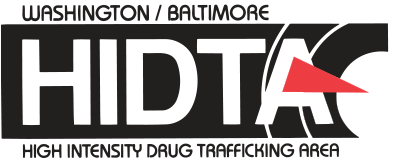
W/B HIDTA Studies the Business of Drug Trafficking with its Groundbreaking “Narconomics” Project, Funded by the Office of National Drug Control Policy
This year, the Office of National Drug Control Policy (ONDCP) awarded the Washington/Baltimore High Intensity Drug Trafficking Area (W/B HIDTA) program $390,660 to study “narconomics” to continue the fight to save lives from overdoses. Borrowing from the fields of economics, business management, and administration, this research will analyze the dynamics and inner workings of drug trafficking organizations (DTOs).
The researchers are seeking to understand the business structures and dynamics of DTOs, including their management, human resources, finance, accounting, marketing, sales, supply chain, and information technology. With this knowledge, law enforcement, treatment, and prevention professionals will be able to create additional avenues for disrupting the drug supply and, ultimately, reducing demand from consumers. Part of the research will involve interviews with individuals who are incarcerated for drug trafficking, discussions with experienced narcotics investigators, and in-depth case record reviews.
W/B HIDTA Executive Director Tom Carr explained, “We want to understand the business of the business.”
The federal funds will support the first phase of a complex, multi-year, multi-phase project within five major U.S. cities and their respective HIDTA programs:
1) Baltimore, Maryland (Washington/Baltimore HIDTA);
2) New York City (New York/New Jersey HIDTA);
3) Cleveland (Ohio HIDTA);
4) Salt Lake City, Utah (Rocky Mountain HIDTA); and
5) Portland, Oregon (Oregon/Idaho HIDTA).
The W/B HIDTA is collaborating with the U.S. Drug Enforcement Administration (DEA) and the Centers for Disease Control and Prevention (CDC), who, along with the executive directors of the five respective HIDTAs, the ONDCP’s National HIDTA Program Director, and the project co-directors will comprise the Governing Board to provide oversight. The project also includes subject matter experts across the country with wide-ranging expertise in drug policy, economics, public health, investigations, analysis, and the justice system.
As a result of the dissemination of this research, law enforcement agencies will be able to identify DTOs’ most significant vulnerabilities, threats, and liabilities, and design effective strategies for dismantling the organizations and taking their product(s) off the street. The research efforts will also provide significant opportunities for identifying areas for collaboration among public health, behavioral health, and harm reduction partners, and for linking people who use drugs with treatment and/or care. This collaborative endeavor will also lead to future targeted substance use prevention efforts.
Dr. Amber Scherer, project co-director, stated that, “This project has the potential to make drug investigations more effective by driving strategic decision making and planning, and informing drug policy at multiple levels. We are looking forward to the significant contributions this research will make for communities across the country and the countless lives that will be saved.”
For more information on this project, contact jscherer@wb.hidta.org or (443) 936-9688.
